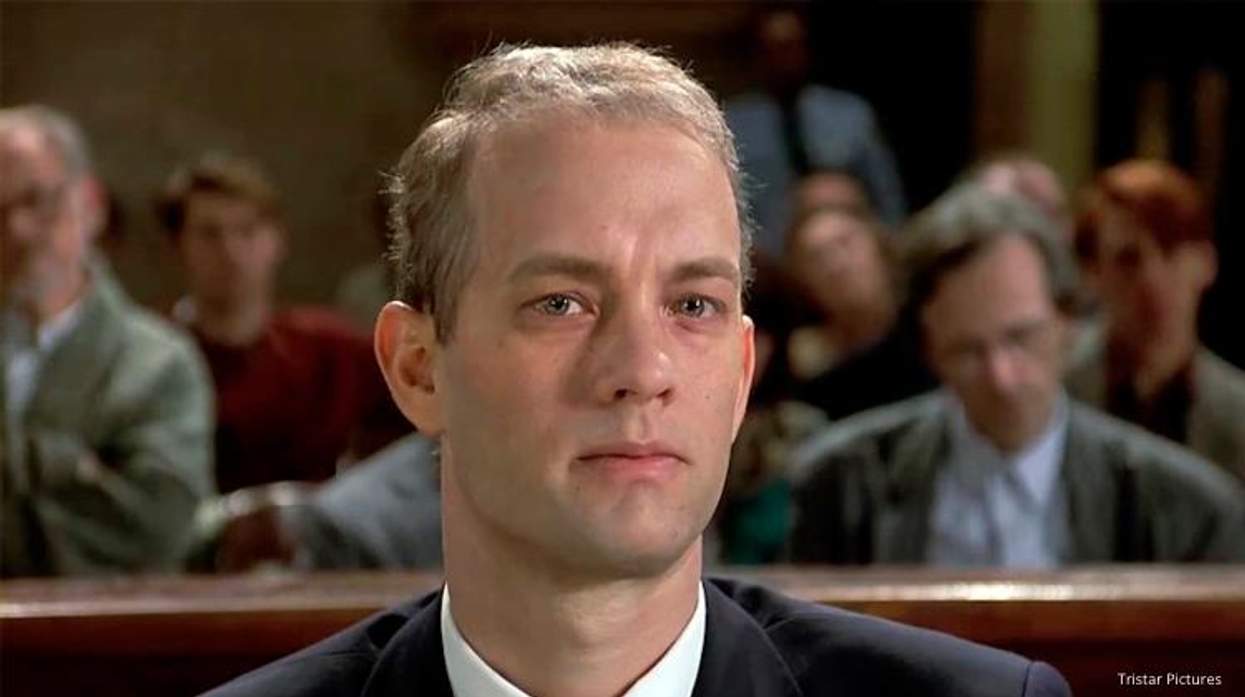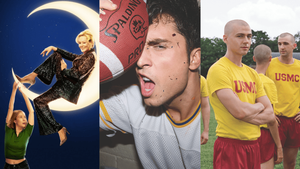The town filled the theater. If it wasn't the whole town, it certainly felt like it. It was winter, in Provincetown, 1993. Crusts of dirty snow lined the parking lot, and it was the time of year when people didn't leave their houses unless they had to.
We were here for the first showing of Philadelphia, which was no small thing for a town that functioned as a safe haven for people with HIV and AIDS. While neither my boyfriend and I believed we were HIV-positive, many people in the audience had struggled with chronic illness, or with the deaths of partners and friends. And yet, in the minutes before the curtain went up, there was a jovial mood in the room. People were excited to be together in one place. Everyone walked around telling dumb jokes, hugging one another and laughing as if we were all celebrating a birthday.
Then the curtain fell and the mood shifted. I felt the crowd's absorption almost bodily. Every sound and action on the screen was scrutinized and taken in like no other movie I'd ever seen. My boyfriend squeezed my hand at every moment he was touched or disturbed. I was involved too, though I was aware of the courtroom drama being used as a framing device.
I wanted to get to the heartbreaking parts, between the lovers, or at the hospital, where affection could be up front and visible. I wanted to get past the scenes in which the straight male characters expressed their homophobia. The actors expressed their homophobia with such relish they almost snapped off the heads of their words. My whole body tightened each time they got going. They didn't sound like they detested gay men for how they walked across the room, or for how they dressed or shaped their vowels. Their disgust focused purely on sex.
"OK, I'm prejudiced. I don't like homosexuals," says Denzel Washington's character in a manner that assumes agreement, and until that moment I was in the dark about why people supposedly hated us. By giving so much air space to that disgust, the movie told the viewer, we can't stand who you are at heart. If we're your ally, it's only testament to our generosity, to how much we're willing to overlook.
This observation troubled me to such a degree that I shut down. And just when I thought there was nothing more for me to see and learn up on the screen, a man a few rows behind us, on the far side of the theater, stood up and stumbled past the people in the seats. He was crying, and crying in such a way that demanded to be seen, which wasn't a small thing, as he was tall, sinewy, determinedly masculine, not the type you'd associate with displays of emotion. I'd seen him around town, at the bars or at the A&P, either in a white T-shirt, or in flannel with the sleeves hacked off, a man of about 40, though it was hard to tell anyone's age back then when sickness aged people decades beyond their years.
His face told us he knew he wasn't going to live much longer. He had to get out of there. And in his outburst it felt as though he drew the movie into himself. He became the movie, and we were all in it, and once we saw ourselves as actors, the horrible dream of AIDS was not just a dream anymore. It was real. And it destroyed us.
Why hadn't the churches or the government helped? Why were we all on our own when 306,000 people--in the United States alone--were living with HIV that year? These were not new questions, of course, but I felt them freshly, in my blood.
On the drive back home through the woods, my boyfriend and I were too upset to talk. I felt an agitation in the space between my throat and my chest, a corral of two conflicting desires: the desire to be seen and the desire to be completely uncaptured--an uncharted wilderness, like the woods flying by outside the window.
I knew it was a paradox I'd never resolve, but if given the choice between the two, I wanted to be seen. I knew it was crucial to get our stories on the screen. People weren't going to attend to our rage unless a big Hollywood movie was willing to say we existed.
In truth, I craved representation of queer life so badly that my hopes contorted whatever it was I saw. Everything on the screen usually felt so wrong. Something was usually off. A character was typically too polished or too careful, but the queer world I knew was alive with contradictions, full of people who couldn't be shoehorned into any category or style, people who were just as messy as anybody. Every time I saw one of us on the screen it was to make some kind of point, and the heaviness of that crushed our individuality.
Was that why the man pushed his way out of the theater? Had the movie's good intentions failed him to the point where he couldn't stand it? Or, conversely, did he in fact see himself on trial once the Tom Hanks character was asked to take off his shirt to reveal his KS lesions to the courtroom?
Eight years before, my mother and I happened to be in the same room at the same time, in the house of my childhood. I'd heard a little bit about An Early Frost, the made-for-TV movie about to air. It had run up against some controversy (as they say).
I knew it was a movie with gay characters, and I knew it was about a character with AIDS, played by a handsome actor I'd seen in other movies, a guy with a deep voice and hard, athletic body whom I certainly had a crush on. I had an urge, a molten urge, to bolt from the room the instant I saw his face on-screen--but I stayed.
I stayed even when I knew I couldn't hide my deep interest in the actor, even when my mother lifted her face from the magazine in her lap, even when I felt her watching my reactions with such intensity that my face went red hot. It already mattered less to me that this was a story of a man taken down by AIDS, a man who loses his job, his boyfriend, his relationship with his family, even his once-beloved sister. He was strong, shining, and real, not contorted to be some representation of an idea. And maybe that was why my mother's face went dark and inscrutable. The man on the screen captured her son and put him up there in his place. She wanted her world back. She wanted her son again, or at least the story she'd always carried of her son, which was the story of someone who'd live a very long time, free of prejudice and illness, a person who didn't make others flinch when he held out his hand to shake. What stranger had stolen him from her?
Yet she stayed in that room with me, for as long as she could bear it. And though I can't say we talked about any of this--it would take years before we could get to that place--I could say a curtain lifted in the atmosphere between us.
Thirty-five years have gone by since that run of An Early Frost. My mother is gone, I am no longer young, and though you'd expect that movie to feel antiquated by now, it isn't that way at all. It feels as though the roles were performed not just for that moment, but outside of time, which I suppose is true for any representation that succeeds, regardless of genre.
These days, I sit on the 3 train and look up at an ad featuring two women together, see a gay male couple on a situation comedy speak with such queeny abandon that worries about stereotypes are out of the question. We're oh so evolved, or too sophisticated for such worry -- at least that's what we've been directed to think. All of it still feels a little false somehow, too knowing, too engineered.
Maybe what I really want is a world in which representations of me, of all queer people, could matter less, could be in the background, or in the middle, as much as the foreground. For example: See those two guys holding hands as they cross Atlantic Avenue? Let's put them in the background of a scene in a movie that has nothing to do with them at all. Let's let them be unchartable for a while, and turn up the spotlight on them in a different film where something between them is actually at stake. Only then will I know that we've changed the world.
Paul Lisicky is an award-winning author and associate professor at Rutgers University-Camden, living in Brooklyn, N.Y. His sixth book has just been published, Later: My Life at the Edge of the World (Graywolf Press). @Paul_Lisicky




































































Charlie Kirk DID say stoning gay people was the 'perfect law' — and these other heinous quotes